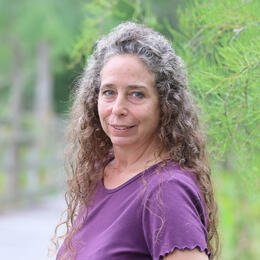The phrase “Life’s a Beach” typically connotes a relaxing atmosphere with warm sunshine, bright white sand, and maybe even a cool drink with a little umbrella. But the beach is not always a hospitable place for sea and shorebirds trying to raise their families. Several species of beach-nesting birds face threats like coastal storms and red tide each year, in addition to people, beach balls, drones, and dogs—this recipe can spell disaster. Luckily, Audubon Florida’s relationship with coastal law enforcement officers is the best ingredient for managing violations at protected areas, resulting in wins for the birds in many locations in 2023.
Apalachicola Shorebird Biologist Natasza Fontaine monitors nesting efforts across the Panhandle, where law enforcement agencies improve on-the-ground conservation efforts.
At Phipps Preserve, for example, as Fontaine and her team of bird steward volunteers make their rounds on the busy beach, law enforcement officers on ATVs follow behind to reinforce the laws and educational messages for all. Beach goers who see this cohesive effort are more likely to realize the gravity of the situation.
“We’re able to provide more protection to the birds and people seem to be more open to listening when they know there may be legal repercussions,” said Fontaine.
Megan Hatten is the Southwest Florida shorebird biologist and is grateful for the large cooperative effort underway each year at Fort Myers Beach. Audubon uses grant funds to hire Lee County sheriff’s deputies to provide extra coverage over the holidays. Last year at Carlos Beach, officers spotted and stopped a group with fireworks from going onto the nesting beach. The colony might have been abandoned if fireworks were set off at that location.
Meanwhile in Collier County, Hatten explains the ripple effect that happened when the FWC officers found the owner of a luxury shelling/camping company guilty of entering Second Chance Critical Wildlife Area (CWA).
“The fine was small, but word got around quickly that the CWA was being enforced, which resulted in fewer violations later in the year,” Hatten added. She is hopeful that trend continues.
Audubon has also built strong relationships with state and local law enforcement agencies in the Tampa Bay area, where bird stewards are known by name to several FWC officers because of the time they take to build relationships.
FWC schedules officers at critical times during the two major holiday weekends, Memorial Day and July Fourth, to provide support to our bird stewards in Pinellas County.
Holley Short, Tampa Bay shorebird project manager, is relieved to have such good partners.
“Their assistance with education is crucial for ensuring the safety of nesting shorebirds and seabirds, their eggs, and their young chicks,” says Short.
While raising a family on the beach still has many challenges, it is slightly safer for them now, thanks to this wonderful partnership.
This article appeared in the 2023 Coastal Report.




